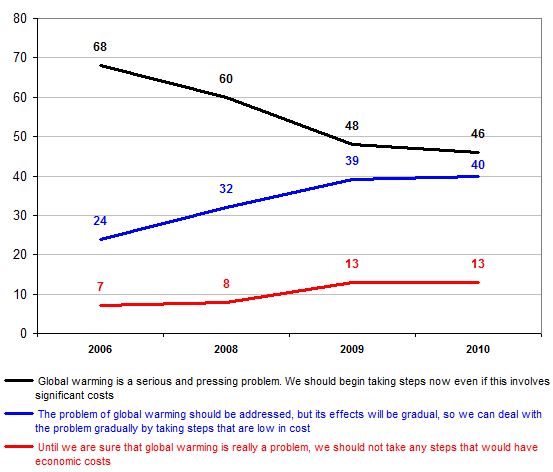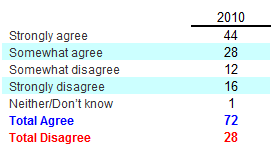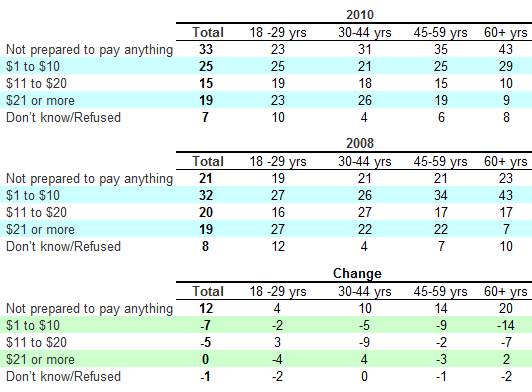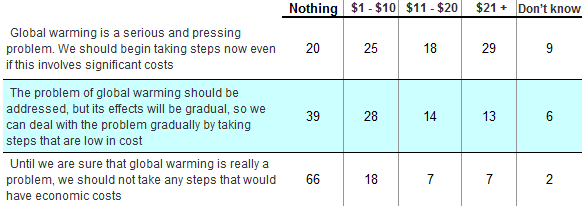The Lowy Institute has released their annual Lowy Poll that mostly focuses on various aspects of foreign policy related public opinion. We’ll go through the broader poll a little later on today, but first up it’s worth going through the responses to a set of global warming questions they asked – and in some instances, have asked over a number of years.
This year’s poll is a phone poll that ran off a sample of 1001, giving us an MoE that maxes out around the 3.1% mark.
The first global warming question asks:
There is a controversy over what the countries of the world, including Australia, should do about the problem of global warming. I’m going to read you three statements. Please tell me which statement comes closest to your own point of view.
They’ve asked this question 4 times in five years, allowing us to see some longer term trends in the responses:
The trends here are consistent with what we’ve seen from the Morgan phone poll results over the same period – where the urgency of public opinion on the need for action has waned over the last 3 years.
The next question asks about public opinion on unilateral climate change action, with some interesting results.
At this stage there is no global agreement to reduce carbon emissions. Do you personally agree, or disagree that Australia should take action to reduce its carbon emissions before a global agreement is reached?
72% of the public believe that Australia should take unilateral action. We know from the first question that only 46% of the public support action that involves significant costs while 40% believe in gradual, low cost action – but what numbers do the public attach to “significant” and “low” costs?
The Lowy Poll adds some meat to the bones of this question in terms of personal financial costs with their next question:
One suggested way of tackling climate change is to increase the price of electricity. If it helped solve climate change how much extra would you be willing to pay each month on your electricity bill? Please say an amount, rounded off to the nearest ten dollars.
They also asked this question in 2008 – so we’ll run through both results, by age cross-tabs, and look at how the willingness to pay has changed over the last 2 years.
Across the total Australian population, the proportion of people not prepared to pay anything has increased from 21 to 33%, while the proportion of people prepared to pay some amount has remained steady or dropped across all nominated ranges of cost values.
The age breakdowns have shown some quite dramatic shifts. While 18-29 year olds have not shown any significant movement over the last 2 years in terms of willingness to pay, the 60+ age group has shown a 20 point increase in the proportion not willing to pay any increase in electricity prices and where most of that shift came from people willing to pay a small amount (1-10$ per month) two years ago.
The older a person is, the more likely they are to not only be not prepared to pay higher electricity prices, but over the last two years, the older a person is the more likely they were to increase their opposition to paying higher prices.
Lowy also produced some cross-tab results for the first question against the responses of this willingness to pay question:
A full 20% of the those that believed in the need for immediate action that carries with it significant costs weren’t actually prepared to shoulder any of those significant costs themselves via increased electricity prices. In fact, only 29% of the people that believed in action involving significant costs were willing to pay significant costs themselves in terms of paying $21 or more a month for their electricity.
This is like those standard polling results that show a large majority wanting more government services, and the same sized majority wanting lower taxes. Climate change, like so many other areas of public policy in Australia, is an exercise in rank public hypocrisy – oh yes, we all want X,Y and Z, but someone else can pay for it.











Crikey is committed to hosting lively discussions. Help us keep the conversation useful, interesting and welcoming. We aim to publish comments quickly in the interest of promoting robust conversation, but we’re a small team and we deploy filters to protect against legal risk. Occasionally your comment may be held up while we review, but we’re working as fast as we can to keep the conversation rolling.
The Crikey comment section is members-only content. Please subscribe to leave a comment.
The Crikey comment section is members-only content. Please login to leave a comment.